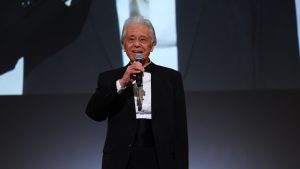
In the five years since Hiroyasu Ando took sole charge at the top of Tokyo International Film Festival, the progress made under the energetic octogenarian former diplomat is palpable. Despite the distinctly inauspicious start of his first full event in charge unfurling under the cloud of a global pandemic, the Tokyo festival is now generating more buzz than it has in decades.
An increase in world premieres, international guests and side events, along with the relocation to the more accessible and atmospheric Hibiya-Ginza-Yurakucho districts, are helping to boost the festival’s profile and clout. However, Ando seems unwilling to rest on his laurels, determined to continue driving progress, attract more local cinemagoers and strengthen the event’s impact beyond cinema.
Ando sat down with The Hollywood Reporter as this year’s edition was getting underway to share his thoughts on what the festival was getting right and what was still left to do.
Do you feel the festival has got off to a good start, even though you were competing for attention with President Trump’s arrival on the evening the event opened?
So far, so good. I was worried about the overlap, but luckily it worked out. As I said in the opening ceremony, it rained over the weekend and I was worried because we had the red carpet on Monday. But the weather turned out fine, and we had a lot of attention. The Japanese media, especially TV, covered it extensively, showing the movie stars and directors who attended. Ticket sales have been strong so far. This year we have many movie stars from Japan and abroad. I just came from the ceremony presenting the Lifetime Achievement Award to director Yōji Yamada. His film Tokyo Taxi is our festival centerpiece this year, starring Chieko Baisho and Takuya Kimura. They both attended, it was a wonderful celebration.

It’s amazing that he’s still making movies at 91.
Exactly. Although he’s most famous for Tora-san [Yamada wrote and directed 46 of the 48 Otoko wa Tsurai yo (It’s Tough Being a Man) films about an unlucky-in-love peddler from 1965 to 1995] he has made many great films about postwar Japan and how people lived. He’s also a living dictionary of Japanese cinema. He’s educated many younger filmmakers and has a deep interest in world cinema too. That’s why we chose to honor him this year. Yamada-san was previously given the festival’s first Akira Kurosawa Award in 2004, alongside Steven Spielberg.
The other lifetime achievement award went to Sayuri Yoshinaga, right?
Yes, I presented it to her at the opening ceremony. Her film was also the opening film. In fact, our three main films — the opening, centerpiece, and closing — each focus on women. The opening film is about the first woman to climb Everest; the centerpiece, Tokyo Taxi, is about the journey of an elderly woman from her house to a nursing home; and the closing film is Hamnet, directed by Oscar-winner Chloé Zhao, about Shakespeare’s wife. We did this intentionally: women’s empowerment is one of this year’s main focuses.
You signed that 5050×2020 [Cannes-led gender equality] pledge a few years ago? Have you released new figures for the festival organization?

Yes. Among all staff, women made up 56.8 percent last year and 57.3 percent this year. For senior positions, the ratio went from 30.8 percent to 33.3 percent. It’s rising gradually, and women now make up more than half of our staff.
How much impact do you think these efforts have beyond the festival?
Well, we have the first female Japanese prime minister. I hope our international film festival had a certain contribution to the selection of a woman prime minister (laughs). I think society is putting more emphasis on women, and we want to help drive that progress.
You’ve also talked about contributing to harmony through cinema. Realistically, how much impact can a festival or films have in that sense?
True, it’s hard to measure. But around the world, divisions—social, political, international—are growing. Cinema can promote dialogue among people from different backgrounds, ideologies, or cultures. Films show different perspectives; by watching and discussing them, we build mutual understanding. We’re also encouraging more exchange this year through the festival lounge, with small and large gatherings almost every day for guests from Japan and abroad to meet and talk.

You’ve said before that one challenge is reaching the wider public. Many Tokyo residents still don’t realize the festival is on.
Yes, that’s my ongoing homework. We need to reach not only cinephiles, but ordinary people. Many see the red carpet on TV but don’t think about actually coming to see films. We have to make it feel more open, not just for industry insiders or celebrities. That’s something I still need to improve.
Aside from women’s empowerment, what other initiatives stand out this year?
We’ve launched a new program: the Asian Film Students Conference. We invited 15 student films from cinema schools across Asia and will give an award to one of them. The students have come to Tokyo for seminars, masterclasses, and visits to film-related sites. It’s part of our commitment to nurturing young filmmakers in Asia.

Do you feel you’ve made progress in raising the festival’s international profile?
Yes. The number of premiere films has increased, especially in the competition section. That’s partly because the festival is becoming better known internationally. More people abroad are paying attention and want to come to Tokyo. For example, Juliette Binoche was gracious enough to come this year. We’re moving forward step by step. As the Chinese saying goes: a journey of a thousand miles begins with a single step.
Budgets are always a challenge, but you’ve managed to increase yours, correct?
Yes, by about 30 percent since I started in 2020. Back then, the budget was around 780 million yen ($4.7 million); this year it’s just over 1 billion yen ($6.6 million). But hotel and airfare costs have risen, so it’s still tough. Getting sponsorships is a big part of my job; we added eight new companies this year.

There has been talk of changing the festival dates, is that still on the table?
It’s not easy. We’re held from late October to early November, but by then Venice, Toronto, and San Sebastián have already screened many of the best films. Moving earlier would be nice, maybe to July, but it’s too hot, and it overlaps with summer vacations. Plus, our government budget is finalized in March, so we can’t begin planning early enough. It’s something we’ll keep discussing. But this is the best season in Japan — comfortable and dry.
No thoughts of retiring yet?
Nobody knows (laughs).

#Tokyo #Festival #Chairman #Discusses #Trump #Budgets #Gender #Pledge






